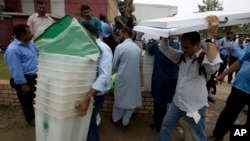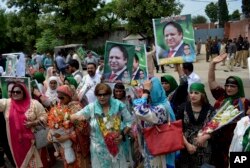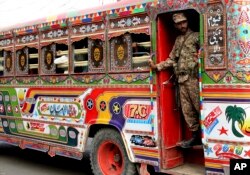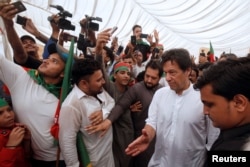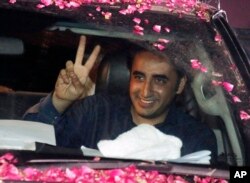Pakistan has 200 million people, 100 million of whom are registered to vote for the next government on Wednesday. The election is being held after a contentious campaign rife with allegations of pre-poll rigging and covert interference by the country's powerful military establishment and the judiciary.
The country has a parliamentary system similar to Britain. Parliament has two houses, the National Assembly or the lower house, and the Senate or the upper house. Candidates for the lower house are directly elected while they in turn elect senators.
Of the 342 assembly seats, 272 are directly elected while the other 70 are reserved for women and minorities and are given to various political parties based on their percentage of winning seats.
Pakistan has four provinces, each with its own assembly. Elections for members of provincial assemblies will be held at the same time the national elections are held. More than 100 million people are registered to vote.
Political parties
The Election Commission of Pakistan has registered 120 political parties and two electoral alliances, in which multiple parties have joined hands to apply for one election symbol. Out of those, 96 parties are competing in the elections, along with a number of independent candidates.
However, only a few parties are expected to have a significant presence, especially on the national scene.
Pakistan Muslim League-Nawaz (PML-N)
The Pakistan Muslim League-Nawaz is the incumbent party that ruled not just the federal government for the last five years but also the country's most populous Punjab province. It is also the party of ousted prime minister Nawaz Sharif, who is serving a 10-year jail sentence in a corruption case. His daughter and heir apparent, Maryam, is serving seven years in the same case.
Sharif claims the court's decision was politically motivated — a punishment for him standing up to the country's military in an effort to establish civilian supremacy in a country that has been ruled directly or indirectly by the military for at least half of its existence.
The party is now led by his younger brother Shahbaz Sharif, who served as the chief minister of Punjab. The province has seen more infrastructure development and better human development than the other three provinces. However, critics claim the party has used its grip on the central government to divert resources to the province to solidify its voter base.
The PML-N has based its campaign on the allegations of pre-poll rigging and a conspiracy by the country's powerful military, assisted by some members of the judiciary, to keep it out of power.
Pakistan Tehreek e-Insaf (PTI)
Pakistan Tehreek e-Insaf is party of cricketer turned politician Imran Khan. In the last election, his party emerged as the second largest party in terms of popular votes and the third largest in terms of winning candidates.
Khan has based his campaign on accusing the two largest parties, the PML-N and the PPP, of indulging in dynastic politics as well as massive corruption, and has promised to change the political culture. His message resonates with the country's educated, urban, middle classes and he is credited with energizing youth. He is also credited with bringing issues of the common man, like education, healthcare, and clean water, into focus.
However, critics claim he has increasingly compromised his own principals in a bid to win power by allowing people he previously accused of corruption to join his ranks. He is also alleged to be the military's favorite candidate in the elections and is accused of receiving covert support. Khan denies the allegations and claims his accusers are afraid of failure.
Khan's party, the PTI, was in power in the Khyber Pakhtunkhwa (KPK) province for the last five years and has received mixed reviews on its performance.
Pakistan People Party (PPP)
This is the party of slain former prime minister Benazir Bhutto. Her son, 29-year-old Bilawal Bhutto Zardari, is leading his first election campaign. His party, which was in the government from 2008 to 2013, suffered a massive defeat in the last elections due to poor performance, particularly in the energy sector. Power outages lasting hours per day were common toward the end of its tenure. However, it retained its base in the Sindh province, where it formed a provincial government. Bhutto's father, Asif Ali Zardari, is one of the people Khan accused of massive corruption.
A detailed party manifesto promises poverty eradication, empowerment for women, improving labor policies, and much more. However, the party suffers from a trust deficit, since critics say it failed to deliver on similar manifestos in the past.
However, the presence of the young Bhutto seems to have revitalized the party. The PPP's election rallies have seen tens of thousands of excited supporters. The party is once again expected to maintain a strong presence among its base in Sindh province.
Islamist parties
A number of Islamist parties are fielding hundreds of candidates in Wednesday's elections. Some of them have been in Pakistani politics for decades. A grand alliance of religious parties called Muttahida Majlis e-Amal (MMA), was first established in 2002 when General Pervez Musharraf held elections. It won enough seats to form provincial governments in two of Pakistan's four provinces — KPK and Balochistan. The alliance later fizzled but has been reassembled under the same election symbol for this vote.
A relatively new party called Tehreek e-Labbaik Pakistan (TLP) has emerged with candidates for more than 150 national assembly and several hundred provincial assembly seats. The party gained national recognition when its members brought the federal capital to a halt last November for 20 days over a religious issue.
Mainstream political parties have also expressed their concern over reports that members of banned extremist groups are being allowed to run in these elections. One such group is Jamaat ud-Dawa (JuD), that is on the United Nations and U.S. terrorist lists. The group formed a party called the Milli Muslim League. When the Election Commission denied it registration as a political party, it started fielding its candidates under a new name, the Allah-o-Akbar Tehreek. However, candidates displayed both the MML name and a picture of Hafiz Saeed, JuD's leader, who is also on U.N. and U.S. terrorist lists, prominently on their posters and banners as well as in their ads in local newspapers.
Another party, called the Rah-e-Haq, is supposed to be fielding candidates belonging to a banned sectarian outfit called Ahl-e-Sunnat Wal Jamaaat (ASWJ). Its leader, Mohammad Ahmad Ludhianvi, was on a terrorism watch list but his name was removed before the elections.




